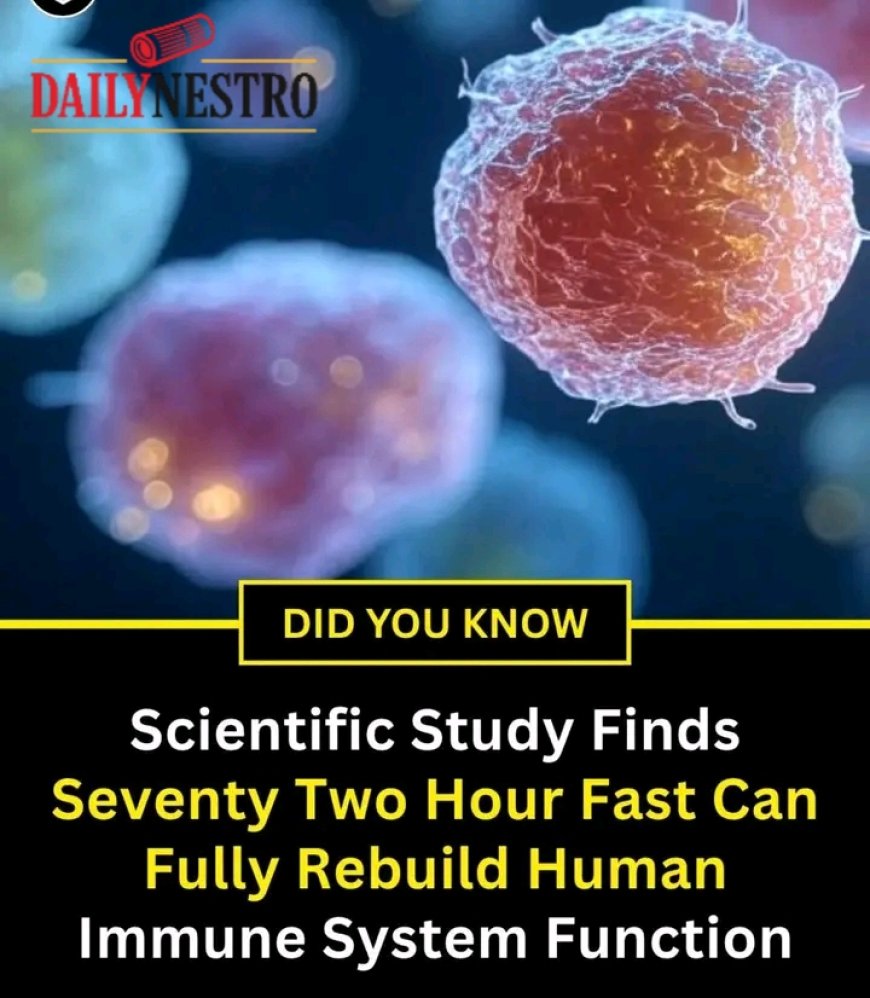Can a 72-Hour Fast Really Reset Your Immune System? Here's What the Science Suggests
Can a 72-Hour Fast Really Reset Your Immune System? Here's What the Science Suggests

Can a 72-Hour Fast Really Reset Your Immune System? Here's What the Science Suggests
In recent years, fasting has moved from being a fringe wellness trend to a topic of serious scientific inquiry. Among the most intriguing claims to emerge is the idea that a 72-hour water fast three full days without food can help reset or regenerate the immune system.
While it may sound extreme or even unbelievable at first, a growing body of research suggests that this natural, time-honored practice could play a powerful role in supporting immune health and promoting cellular repair. So, what really happens to your body during a 72-hour fast? And is it something you should consider?
Let’s explore what the science says and how you can approach fasting safely and mindfully.
What Happens to Your Body During a 72-Hour Fast?
When you fast, your body undergoes a series of profound changes at the cellular and metabolic levels. Here's a breakdown of the key stages and their potential impact:
0–24 Hours: Glycogen Depletion and Fat Adaptation Begins
▫️ In the first 12 to 24 hours of fasting, your body uses up stored glucose (glycogen) from the liver and muscles.
▫️ As glycogen stores deplete, your body begins transitioning to fat as a primary fuel source, producing ketona an alternative energy source for the brain and body.
24–48 Hours: Ketosis and Autophagy
▫️By the second day, your body is typically in full ketosis, and autophagy increases significantly.
▫️Autophagy is a cellular process where damaged or dysfunctional cells are broken down and recycled. It's your body’s natural way of "cleaning up" internal waste and making room for healthy new cells.
48–72 Hours: Stem Cell Activation and Immune Regeneration
▫️ This is where it gets interesting. Studies have shown that by the third day, the body begins to trigger stem cell-based regeneration of the immune system.
▫️Old or damaged white blood cells are cleared out, and new immune cells are generated, essentially creating a stronger and more efficient immune response.
Scientific Backing: What the Research Says
A key study from the University of Southern California (USC) led by Dr. Valter Longo found that prolonged fasting can stimulate hematopoietic stem cells to regenerate the immune system. Their research showed that fasting for 72 hours resulted in a significant drop in white blood cell counts, followed by a surge in the production of new, healthy immune cells once eating resumed.
According to Dr. Longo, “When you starve, the system tries to save energy, and one of the things it can do to save energy is to recycle a lot of the immune cells that are not needed.”
This effect was observed not only in healthy individuals but also in older adults, suggesting that the immune-regenerative potential of fasting could have implications for age-related immune decline and even support for patients undergoing chemotherapy.

Potential Benefits of a 72-Hour Fast
While more research is needed, particularly large-scale human trials, early studies and anecdotal evidence suggest several promising benefits of a 72-hour fast:
1. Immune System Support
Helps flush out damaged immune cells and promotes the generation of new ones, potentially improving the body's ability to fight off infections and illnesses.
2. Reduced Inflammation
Fasting may help lower markers of chronic inflammation a root cause of many health conditions including heart disease, arthritis, and diabetes.
3. Improved Gut Health
A short-term fast gives your digestive system a rest which may support gut healing and reduce issues like bloating or indigestion.
4.Mental Clarity and Focus
As ketone levels rise, many people report enhanced mental clarity and improved cognitive function during fasting.
5. Cellular Rejuvenation
Processes like autophagy and mitochondrial repair can help slow down cellular aging and promote overall longevity.
Metabolic Reset:
Fasting can improve insulin sensitivity, stabilize blood sugar levels, and support weight management when part of a healthy lifestyle.
Is a 72-Hour Fast Right for You?
While the benefits are compelling, it's important to remember that extended fasting is not suitable for everyone. Here are some key considerations:
Who Should Avoid Prolonged Fasting?
▫️Individuals with diabetes or blood sugar regulation issues
▫️Pregnant or breastfeeding women
▫️ People with a history of eating disorders
▫️Those with certain medical conditions or on medications
▫️Anyone under 18 years of age
If you’re considering a prolonged fast, especially one as long as 72 hours, it’s strongly recommended to consult with a healthcare professional first. Medical supervision can help ensure that the fast is safe, appropriate for your body, and aligned with your personal health goals.
Tips for a Safe and Effective 72-Hour Fast
If you're new to fasting or want to try a 72-hour fast, here are some basic tips to help guide your experience:
1. Start slowly: Begin with shorter fasts (e.g., 16–24 hours) before attempting a 72-hour fast.
2. Stay hydrated: Drink plenty of water throughout the fast. Some also choose to include herbal teas or electrolytes to maintain balance.
3. Rest and relax: Fasting puts your body in a healing mode. Avoid intense physical activity and prioritize rest and mindfulness.
4. Break the fast gently: After 72 hours, reintroduce food slowly with easily digestible meals. Bone broth, steamed vegetables, and healthy fats are good starting points.
Conclusion:
A 72-hour fast may sound like a test of endurance, but the science suggests it’s much more than that. When done correctly and safely, it can offer a powerful reset for your immune system, support cellular health, and promote overall wellness—all without the need for supplements or expensive treatments.
As with any health strategy, listening to your body and working with a professional are key to ensuring safety and success. Fasting isn’t a magic cure-all, but it may be one of the most natural and effective tools for supporting long-term health.
Disclaimer: This article is for educational purposes only and does not constitute medical advice. Please consult a licensed healthcare provider before beginning any fasting or dietary regimen.
The sources: National-institute-of health ,







